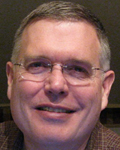![]()
Songs in the South, Part Two
(Live from the Tabernacle Choir)
by Robb Cundick
A journal of the Mormon Tabernacle Choir’s Southern States Tour continues…

We happened upon this LDS Church on St. Charles Avenue in New Orleans.
My last entry was Sunday evening in New Orleans. It is now the evening of Day Five (Tuesday) and we have arrived in Birmingham, Alabama. This is one of the few evenings with nothing scheduled. The break is welcome after a long bus ride from New Orleans.
In New Orleans
Monday morning there was time for a little sightseeing. My traveling companion, Tom Porter and I decided to pass up the bus tour taken by most of the Choir and do something on our own. We took a trolley ride to Carrolton, enjoying the leisurely pace and a breeze from wide-open windows. It made the heat and humidity more tolerable to people accustomed to dry desert air. On the way back we got off to stroll along St. Charles Avenue and look at beautiful old homes. We were excited to come upon a handsome little LDS Church – too bad the door was locked.

Side entrance to the Saenger Theatre echoes a more elegant time.
The concert was in historic Saenger Theater, built in 1927. Its interior was adorned with restored Italian Renaissance dcor, but the exterior has seen better days. We were made to feel very welcome – the Governor of Louisiana and Mayor of New Orleans declared it, “Mormon Tabernacle Choir Day” and we were treated to a full police escort from hotel to theater. But whether due to the locale, steep ticket prices, lack of marketing, or a combination the three, this concert didn’t sell well. [I asked Choir Manager Brent Peterson about ticket prices and learned the Choir has little control over them – the hall managements dictate them]. The downstairs seats were mostly empty – the main audience was high up in the balcony.
In my 11 years with the Choir I have not experienced sparse attendance very often, but it does seem to happen once or twice on a longer tour. It is difficult not to let such a disappointment affect our performance, but I try to think of it as an opportunity to test my dedication to the principle of “reaching the one.” If I am to emulate the Savior in my regard for each and every child of God then my effort should be just as great for an audience of one as it would be for a thousand or even the millions we will perform for in the 2002 Winter Olympics.
I don’t know how others in the Choir motivate themselves, but by whatever means, there was absolutely no letdown at this concert. Brother Jessop seemed if anything to enter the stage with more energy than usual. The technical people had done a remarkable job with the sound system. Despite the fact that the old hall did not have great acoustics, the performance was again stirring. I left with a feeling of elation, and the audience seemed to as well. Thanks be to the Lord for helping us accomplish something worthwhile despite less than ideal conditions in two of the three concerts so far.

Choir Director Dr. Craig Jessop speaks with a Choir Member.
Singing Under Dr. Jessop
I don’t think my series about this tour would be complete without some detail on our conductors, so I’ll take a moment to talk about Craig Jessop. Have you ever seen a man dance with 175 ladies at once? It is a phenomenon I have witnessed repeatedly of late, for that is what happens when Craig conducts the women in Bach’s “We Hasten Thee”. The interaction between them is a joy to watch. Craig leans forward to evoke intensity when entering a musical phrase, then draws back to ask for a slight relaxation before passing on to the next. His right hand beats precise rhythm while the left cajoles, cautions and coaxes as if leading a partner around the dance floor. His face radiates delight, and though I cannot see their faces I am confident the sisters return the sentiment. It is evident in the rich, glowing unity of their sound.
During a concert the temperament of Craig’s baton can go all the way from the delicate and playful I have described to the fiery and bold movements required by the opening and closing numbers. But whatever the mood, he always engages us with focused intensity. He never allows us to slacken or take any piece for granted. You can tell how hard he works from the beads of sweat that seem to multiply no matter how often he wipes them.
Perhaps an adjective such as “energy” ought to be Craig’s middle name. I think the Lord decided to make him shorter than average, then convert the leftover matter to energy, mix with two parts TNT and combine everything into a person of limitless vitality. To meet the increased challenges of the new millennium, the Choir has been blessed with a director who has not only helped us lengthen our stride, but also increased our pace. He is able to keep things fun while still demanding our very best. He is well suited in every way to build upon the excellent foundation erected by his predecessors.

Robert Lentz at his beloved Timpani.
On the Road to Birmingham
On the bus ride today we were entertained and inspired by a monologue from Robert Lentz, the timpanist of the orchestra at Temple Square. The Choir has always had its share of interesting and colorful personalities and the orchestra now adds its contribution to the plate. At 71 years, Bob is the oldest member of both Choir and Orchestra. He is a distinguished looking gentleman with snow-white hair, mustache and a trademark goatee.
Any Utah Symphony fan from the days when their home was the Salt Lake Tabernacle will remember Bob Lentz. When a musical score calls for emphasis, it is most often the timpanist who provides the exclamation point. But Bob supplied drama not only in sound – he delighted the eye as well. No one besides Maestro Maurice Abravanel was as animated as he; I have never beheld a more striking figure at those “kettle drums”. Even today he spins the drum mallets between hard and soft ends with the ease and flare of a gunfighter showing off a pair of six-shooters.
But who would guess that Bob was once a child movie star? He was one of the kids in the “Our Gang” movies made between 1934 and 1936 (later serialized on TV as “The Little Rascals”). I’ll never forget how Spanky and the rest of the Gang made me laugh – they were as big a staple as Howdy Doody. Bob’s stage name was “Spike”; he grew up with such child stars as Mickey Rooney, Elizabeth Taylor, and Roddy McDowell. When bright camera lights threatened damage to his eyes, he changed course to pursue to a musical career.
Bob did not join the Church until his forties – long after coming to Utah to join the Symphony. He described how he was once Mr. Abravanel’s “cigar-smoking buddy.” One day the missionaries knocked and he let them in out of casual curiosity. But though he liked them and let them present the discussions, he had no intention of joining the Church. However he continued to see them and “wore out four sets of them.” Then one day, while he was literally in the process of telling the latest Elders, “I will never join the Church,” he heard a voice saying, “You need to join the Church!” Defiant, he replied in his mind, “But I don’t want to join the [expletive] Church!” The voice was insistent and said again, “You need to join the Church!” Taken aback, he realized this was an epiphany not to be denied, and abruptly changed his mind. “You never saw a more shocked pair of missionaries,” he said.

Robert Lentz and wife Lori. Bob is the Timpanist for the Orchestra at Temple Square.
He went on to relate a more recent experience involving President Hinckley. After joining the Orchestra at Temple Square [Bob had retired from the Symphony many years ago], he was warming up for the first concert when he saw President Hinckley sitting behind him under the balcony of the Tabernacle. “President,” he said, “you could sit anywhere – why did you choose to sit here?” “Well, actually, as a boy I always wanted to play the drums, so I thought it would be interesting to sit here and watch,” the Prophet replied. Brother Lentz said, “President, I’m going to dedicate my performance in this first piece – Death and Transfiguration by Strauss – to you.” Quick as a wink President Hinckley retorted, “Brother Lentz, I certainly hope that is not some kind of omen!”
Bob concluded by saying with a twinkle in his eye that since Choir members are allowed to serve for 20 years he plans to continue until he is ninety (unlike the Choir, there is no age limit in the Orchestra). In the meantime he’ll train up his three-year-old son to take his place (yes – this young-at-heart man has a younger wife and two small children). But he became emotional when he concluded by saying that of all the things he has done as a musician, playing in the Orchestra at Temple Square is the most significant and meaningful.
[If you get the chance, come see the Orchestra at Temple Square either at a Tabernacle Choir Concert or when they perform on their own (upcoming concerts are announced on the Church web site). I guarantee you will have fun watching Bob Lentz and his latest “Gang”.]
Birmingham
It is now the morning of Day Seven (Thursday). We are on a short leg of the tour – Birmingham to Atlanta. The concert last night was at the Birmingham Civic Center Concert Hall, right across the street from our hotel.
In the afternoon we taped “Music and the Spoken Word” before a small audience. It turned out to be an unusually tedious experience. When held in the Tabernacle the broadcast is live, so the downbeat comes at 9:30 AM no matter what. Since this was not a live performance, we had three or four false starts before getting beyond the first piece. Afterwards we also repeated a few short portions. By the time we were done the hot television lights had cooked us to the “well done” stage.

Taping of Music and the Spoken Word (Birmingham, Alabama).
Over 2,000 people came to our concert and something hilarious happened at the end; it is very timely because the perpetrator was none other than Bob Lentz. Just as he hit his final beat (a gigantic smash at the end of “Battle Hymn”) the white head of his drum mallet broke off and rotated wildly as it flew high into the air and landed in the audience. The audience broke into applause and laughter at the same time! Bob calmly held up the remaining sharp end of the stick as if it was all part of the performance. We enjoyed a good laugh as we acknowledged the audience.
But in the end, each concert finishes on a more personal and spiritual note with Choir, Conductors, Organists and Orchestra singing, “God Be With You ‘Til We Meet Again.” Our hearts reach out to the audience as we look to their faces. In areas where we know there are Spanish-speakers we sing a verse in that language as well. Church members in the audience often join with us and we feel a special bond as fellow brothers and sisters. We hope all of the audience feels enfolded by this love and pray that all of us will indeed one day “meet at Jesus’ feet.”
With the hotel so close, we were able to linger and greet people longer than usual. I was particularly impressed with the friendliness of the people of Birmingham. Everyone was so outgoing and vocal in their praise and thanks to us. My roommate Tom was tickled by a woman who said, “y’all did so gooood!” I was pleased to hear a brother exclaim, “you really brought the Church a step forward in Alabama today!” That is our greatest wish for each performance.
Atlanta
The day has passed and it is late night in Atlanta. It has been a remarkable day – one of both aggravation and triumph. Perhaps this will turn out to be the most memorable day of the tour. We arrived at the beautiful Westin Hotel at 2:30 PM after an interesting stop at the Martin Luther King Memorial followed by a quick bus tour of Atlanta. The hotel was not prepared for us. A fortunate few got their keys and went to their rooms, while most of us stood around for an hour only to hop back on the buses and head to the rehearsal.
At beautiful Fox Theater, a sober Craig Jessop cautioned us not to let frustration with the hotel situation distract us from our performance. We could tell he felt anxious and the reason was clear: until his death a few years ago Atlanta was home to Craig’s mentor, the great Robert Shaw; beloved Dean of American Choral Music. Brother Jessop reminded us there would be many members of the Atlanta Symphony Chorus in the audience. There is no city in the country where we would be compared against a higher standard. Mack Wilberg added to our determination by saying he felt we still had a better performance of the delicate, O Magnum Mysterium in us. He added that the missing ingredient must come from our hearts.

Homage to our “Stars.” [But what’s with the spelling of ‘Wilberg’?]
But we were not finished with frustration at the Westin Hotel. Since the quantity of luggage on a two-week tour is too large for the bus baggage compartments we must place most of it in the corridor each night. It is transported overnight to our next hotel and taken to our rooms as soon as possible. When we returned from rehearsal and finally reached our room, the luggage was not there; after dinner it had still not arrived. Departure for the concert was 7 PM but mine arrived 10 minutes late. I hurriedly changed and went down to find I was one of the lucky ones. Fortunately there was once again a police escort and most of us made it in time. [As I later learned, one or two people didn’t get their luggage at all, and some had to take taxis and sneak in late]. As we entered, we reminded one another of the special importance of the concert and resolved to dedicate it to the memory of Robert Shaw.
Challenges such as we faced today seem to come when something especially important lies ahead. But if the Adversary thinks frustrating us will result in an ineffective performance, he is mistaken. In my experience it has usually had the opposite effect: we become more determined and focused than ever. From the opening chime of the Choral fanfare it was clear this concert would be special; we were on a higher plain.
During a performance our conductors frequently give us a finger pointing upwards reminding us that we need to work harder to keep the pitch from sagging. On this night the quality of our performance was marked by infrequent use of that sign. We were especially pleased when Brother Wilberg smiled and nodded at the conclusion of O Magnum Mysterium.
When the concert ended, many in the audience cried out in exuberance. My (admittedly biased) grade for our first four concerts is an “A”. Having all of our music memorized has made our performances so much more polished! But this fifth concert in Atlanta treated the audience to our very best – an “A double plus”. Afterwards I walked to the lobby and talked to an enthusiastic Church member couple. I’m usually timid at meeting new people, but pouring my heart out to the Lord in song gives me extra courage The wife said she wished her non-member Mother had come. What fun it was to give her recording for her Mother – and to be surprised with a big hug in return! .
TO BE CONTINUED
2001 Meridian Magazine. All Rights Reserved.

















